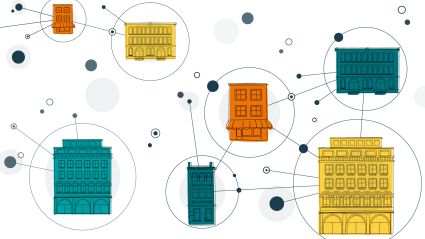
Los Angeles, Calif. – July 14, 2021 – Microbusinesses with an online presence are critical contributors to economic growth and recovery efforts, according to findings from the Milken Institute, published in collaboration with GoDaddy’s Venture Forward Initiative, a multiyear research effort to quantify the impact online microbusinesses have on their local economies. In a new paper, the authors recommend that these businesses, which have 10 or fewer employees, assume a more prominent position in local policy discussions as metro areas recover from the COVID-19 pandemic.
“Exploring the Role of Microbusinesses in Economic Growth and Recovery for US Cities” compares data and rankings from the Milken Institute’s Best-Performing Cities Index, which analyzed how more than 400 metro-area economies performed during the pandemic, and the GoDaddy Venture Forward Initiative that quantifies the contributions of 20 million online microbusinesses to local economic growth.
“Small business growth is an integral part of a healthy economy, which can help make regions less vulnerable to economic shock compared to places dependent on only one or two key industries or companies for employment,” said Kevin Klowden, executive director of the Milken Institute Center for Regional Economics. “Through this analysis, we are better able to determine what these microbusinesses need to thrive, including broadband access and educational opportunities for employees.”
Jeremy Hartman, Vice President at GoDaddy Venture Forward, added: “The goal of Venture Forward is to uncover the impact 20 million online microbusinesses are having on the U.S. economy. By collaborating with the Milken Institute and their Best Performing Cities Index team, we are able to offer policy makers a much richer understanding of how microbusinesses can help build stronger, more resilient, and inclusive economies.”
Key findings from the paper include:
-
Broadband adoption is closely tied to economic opportunity. In metro areas that rank highly on both indexes, nearly three in four households have broadband subscription. These areas – including Madison, Wisconsin; Daphne, Alabama; and Logan, Utah – also are home to more highly educated residents and saw stronger employment numbers during the last year.
-
Conversely, low-ranking metro areas tend to have lower levels of broadband subscription and educational attainment. Many jobs in these cities – including New Orleans, Louisiana; Corpus Christi, Texas; and Saginaw, Michigan – are in lower-wage service sectors such as hospitality, construction, and food services. They generally require in-person attendance and were hampered by the pandemic. Low-income residents of these cities lacked the tools to engage in the digital economy that have been found to help make up for job losses and wage cuts.
-
Metro areas have an opportunity to create complementary sources of economic opportunity through microbusiness density. The decline of U.S. manufacturing has negatively impacted cities like Chicago, Illinois, where heavy industry had been a traditional source of relatively high-paying jobs. One cause for greater optimism? Chicago had one of the highest concentrations of online microbusinesses, which can provide residents with another source of income.
-
Areas that depend on a single industry for job creation and wage growth remain vulnerable to economic downturns. In Fresno, California, agriculture makes up almost one-third of regional jobs, which are often lower-wage and cannot be performed remotely. But improvements to broadband connections, capital access, and education and training could help the region expand its small businesses and generate new opportunities for underserved residents.
Based on these findings, the authors recommend increasing broadband access, increasing education and training opportunities, keeping costs low to encourage entrepreneurship, and helping brick-and-mortar businesses expand their presence in the digital space.
“Exploring the Role of Microbusinesses in Economic Growth and Recovery for US Cities” is co-authored by Aaron Melaas, Charlotte Kesteven, and Misael Galdamez. The paper can be downloaded here.
Media Contact(s)
[email protected] | +1 202 336 8921
GoDaddy: Daffne Gavidia-Hart, [email protected]
About the Milken Institute Center for Regional Economics and California Center
The Milken Institute Center for Regional Economics produces research, programs, and events designed to inform and activate innovative economic and policy solutions to drive job creation and industry expansion.
About the Milken Institute
The Milken Institute is a nonprofit, nonpartisan think tank that helps people build meaningful lives in which they can experience health and well-being, pursue effective education and gainful employment, and access the resources required to create ever-expanding opportunities for themselves and their broader communities. For more information, visit https://milkeninstitute.org/.
About GoDaddy
GoDaddy is empowering everyday entrepreneurs around the world by providing all of the help and tools to succeed online. GoDaddy is the place people come to name their idea, build a professional website, attract customers, sell their products and services, and manage their work. Our mission is to give our customers the tools, insights and the people to transform their ideas and personal initiative into success. To learn more about the company, visit www.GoDaddy.com.










